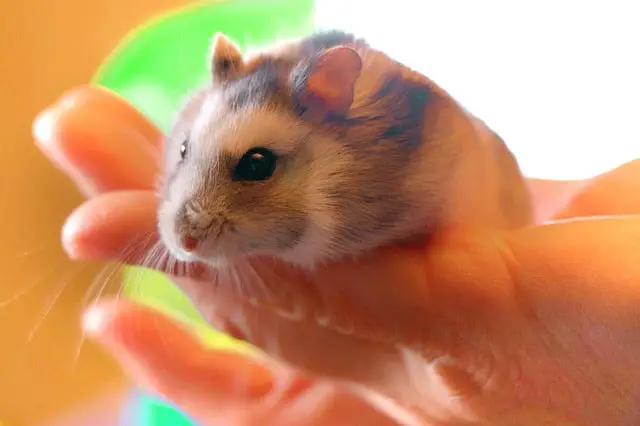
Of course, you want your little companion to stay healthy. But illness and injury cannot always be avoided . In order for your hamster to live as long as possible, ensure it has a healthy life.
How to Keep Hamsters healthy and Happy
Avoid stress
It causes disease and can shorten life expectancy. Stress can result, for example, from living in a group or bullying from a dominant, but also from too much affection. The pregnancy is also a source of stress and can significantly reduce the life expectancy of the female.
Hygiene
Regularly clean his cage and equipment . Lack of cleanliness can cause illness and promote contagion. Find our easy-to-maintain cages .
Correct nutrition
Provide him with a suitable diet . Leftovers and sweets are prohibited , as well as moldy, spoiled or damp foods.
What to eat
The hamster’s incisors grow throughout its life. Objects to gnaw on are therefore imperative . This prevents painful dental problems. To be on the safe side, check their teeth regularly, especially if you notice a change in their eating behavior. As a precaution, consult the veterinarian.
When to see the vet?
Many conditions can be seen with the naked eye, such as bites or diarrhea. You must react without delay. But many illnesses are not immediately visible. There is only one solution: watch your hamster carefully. If you notice hair loss, change in appearance or behavior , see the vet as soon as possible. Don’t wait too long, as these delicate animals don’t have many reserves . The next day may already be too late.
Prevention is better than cure
A hamster that is properly cared for and given a variety of foods often reaches a much older age than the two years given as the norm. Importance of hygiene: bacteria, viruses and parasites can be transmitted to the hamster by other domestic animals, and even human diseases are not without danger for them. This is why it is advisable, when taking care of the animal or playing with it, to wash your hands, before and after.
Mistakes that can make your hamster sick :
- Poor quality food.
- Unbalanced food.
- Air Currents.
- Abrupt changes from hot to cold.
- Air too humid or not humid enough.
- Wet litter.
- Not enough possibilities to gnaw, dig, climb.
- Presence of other animals that the hamster cannot stand (stress).
- Lack of calm during his sleeping hours.
First symptoms of illness in Hamster
If you take care of your hamster every day, you are unlikely to miss a change in attitude, such as the animal stopping eating, climbing, or still looking tired. Unfortunately, the diagnosis is difficult with such small animals and the disease develops rapidly. I advise you, as soon as you notice the first symptoms, to take your hamster to the vet as soon as possible.
First aid in case of cooling
You will notice a cooling to the listless behavior of the animal. His nose is runny, his eyes are watery, and he is not interested in his food as usual. In this case, place the cage in a warm place (21 to 23 ° C) and away from drafts. If, despite this, he continues to not eat, you should seek the advice of the vet.
First aid for diarrhea
Soft or even liquid feces are often the consequence of processing errors, for example bad food, too humid or too cool cage, dirty water, or even feeding exclusively with corn. Remove the greenery, the fruits, and give only grain, good quality hay, as well as a lukewarm chamomile infusion or very light tea (without sugar I). If you don’t see improvement after 24 hours, see the vet.
Manifestations of degeneration
All farmed hamsters are the descendants of only three animals . However, they overcame the inherited diseases that result from this situation well. But we can sometimes see, in an isolated animal or in a whole line, that “something is wrong”: the animal loses its hair prematurely, it has tumors which seem carcinogenic, or abnormal movements. Hamsters should be “put to sleep” by the veterinarian. At the very least, we shouldn’t make them reproduce.
How to Care for a Hamster when he is sick

Take the Hamster to a Vet
Take your hamster to the vet preferably in the afternoon or at the end of the day. If possible, transport him to his cage, covering it with a blanket. If it is too large, choose a suitable container and fill it with a little litter from the cage, and some elements from the nest. Do not put in fresh litter, the vet usually needs to be able to examine the feces.
How to give Medicine to the Hamster
Some drugs are injected by the vet, but you may need to give others yourself. It is not so easy. Indeed, if your hamster generally absorbs everything you present to him without difficulty, he will turn away from the drugs by pouting.
You will surely have to experiment with several methods: either you dilute the powder or the drops in the water of the trough, or you place them on a small treat (mealworm, cottage cheese, piece of meat) that the hamster will come to eat. in your hand. In this way, you will have the assurance that it absorbs well what you give it, instead of filling its cheekbones and going to deposit everything in its nest, medicine included.
How to Disinfect the cage of a Hamster
It may sometimes be necessary, in case of diarrhea for example, to disinfect the hamster’s housing . Wash the cage and all the accessories thoroughly in hot water, then pass the whole thing with the disinfectant which you will have bought in pharmacy or in your pet store.






